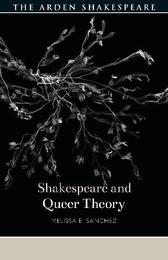
|
Shakespeare and Queer Theory
Hardback
Main Details
| Title |
Shakespeare and Queer Theory
|
| Authors and Contributors |
By (author) Melissa E. Sanchez
|
|
Series edited by Dr Evelyn Gajowski
|
| Series | Shakespeare and Theory |
|---|
| Physical Properties |
| Format:Hardback | | Pages:248 | | Dimensions(mm): Height 198,Width 129 |
|
| Category/Genre | Literary theory |
|---|
| ISBN/Barcode |
9781474256674
|
| Classifications | Dewey:822.33 |
|---|
| Audience | | Professional & Vocational | |
|---|
|
Publishing Details |
| Publisher |
Bloomsbury Publishing PLC
|
| Imprint |
The Arden Shakespeare
|
| Publication Date |
24 January 2019 |
| Publication Country |
United Kingdom
|
Description
Shakespeare and Queer Theory is an indispensable guide on the ongoing critical debates about queer method both within and beyond Shakespeare and early modern studies. Clearly elucidating the central ideas of the theory, the field's historical emergence from feminist and gay and lesbian studies within the academy, and political activism related to the AIDS crisis beyond it, it also illuminates current debates about historicism and embodiment. Through a series of original readings of texts including Othello, The Merchant of Venice, and Venus and Adonis, as well as film adaptations of early modern drama including Derek Jarman's The Tempest and Edward II, Gus Van Sant's My Own Private Idaho, Baz Luhrmann's Romeo + Juliet, and Julie Taymor's Titus, it illustrates the value of queer theory to Shakespeare scholarship, and the value of Shakespearean texts to queer theory.
Author Biography
Melissa E. Sanchez is Donald T. Regan Professor of English and Comparative Literature and Core Faculty of Gender, Sexuality, and Women's Studies at the University of Pennsylvania, USA.
ReviewsSanchez's clear and cogent book is a remarkably concise but thorough introduction to the field. It will also be indispensable to experts, who will find much of value in her perceptive analysis. * Stephen Guy-Bray, University of British Columbia, Canada * This book is beautifully written and a pleasure to read. Although, like other books in the Arden Shakespeare and Theory series, it is addressed to students and nonspecialists, it also offers a tremendous service to specialized scholars by presenting a synthesized and compelling picture of the field of early modern queer theory, honoring its diversity and heterogeneity while also showing its coherence. * Theatre Journal *
|